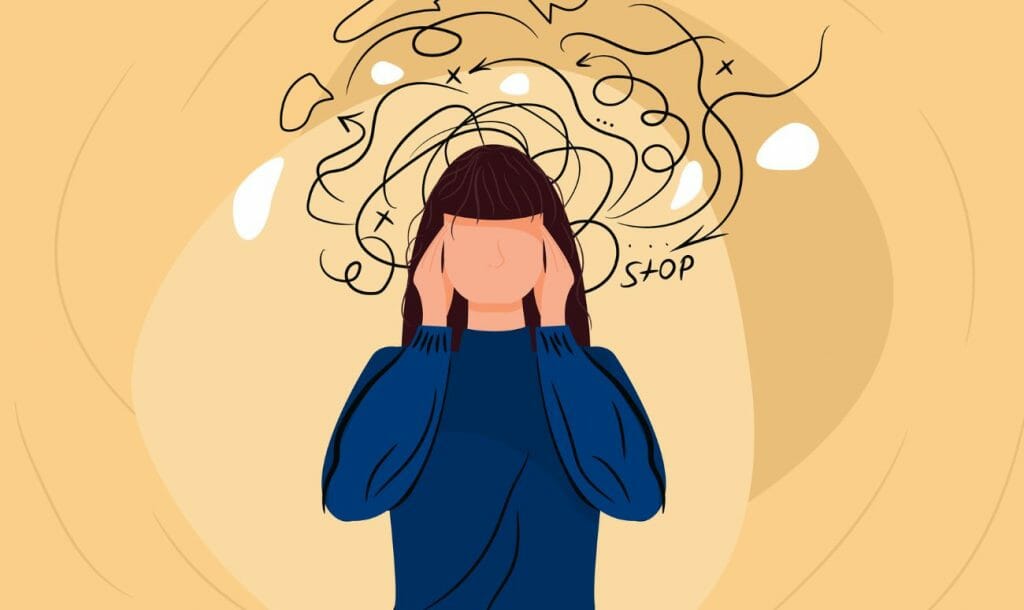Worrying is completely normal and often some feelings of worry can be healthy, pushing us to find solutions to real and present problems. But, it becomes a problem when it gets persistent and difficult to manage. Do you find yourself constantly thinking about the “what ifs”? While having occasional anxious thoughts is normal, excessive worrying and being on the edge on most days could be a sign of something more. It can also put stress on your relationships, interfere with your productivity, hurt your self-confidence, and even stall your career.
But How Much Worry Is Too Much Worry?
For chronic worriers, the idea that they could just stop worrying seems unlikely. Sometimes, worrying can also feel productive, making it difficult for you to take time out to relax and stop thinking about what’s stressing you out. People that chronically worry may find themselves preoccupied with what-if thinking or imagining the worst-case outcome for different scenarios.
But, chronic worry, even about things out of our control, can severely impact our mental and physical health. Once you start worrying, it’s easy to get caught up in a cycle of anxious and automatic thoughts. Over time, this can seriously impact your mental health.
Why Is It So Hard To Stop Worrying?
Worry is a negative thought pattern, and any thought pattern that we use over and over again gets hard-wired in our brains. Once it’s hard-wired, it gets harder to stop.
Even though it may seem like the easier path is to stay stressed, you’ll be happier in the long run if you take the time to learn how to stop worrying.

How Excessive Worrying Affects Your Body And Mind?
When anxious thoughts become part of your daily life, stress can show up at work, with your family, in your finances, and even in your hobbies. Over time, too much worry can impact your emotional resilience and make completing necessary tasks harder. However, its impact is not just limited to your mental state. It can affect your physical health too. Physical signs such as headaches, stomach aches, and shortness of breath among others can be the first sign that you’re experiencing excessive worry.
So, How Can You Stop?
Stopping worrying involves addressing our beliefs, values, and emotions—all things that keep the worry going long after it is useful. So here are the things you can do the next time you catch yourself worrying about things you can’t control:
Dig out the source of your worry
Before working on stopping worry, it can be useful to figure out what’s causing your worry until you get a clearer picture of what’s driving worry for you.
One way you can tell whether the worry is more situational versus more about the way you think is by asking yourself: “is the worry general or specific?” If you only tend to worry about one specific area of your life, like work or a relationship, but you don’t worry about everything else like health, money, etc., your worry might be better addressed by taking some sort of constructive action to alter your current situation. So first ask yourself if there is something you can change in your life to stop the worries altogether.
Set your “worry time”
Why let worry consume your entire day? Set a specific time in your day just for worrying. For example, you could give yourself a 30 minutes time slot in your day to worry about things you have to do. Instead of just thinking about a problem, use this time to brainstorm solutions. If you worry about it outside this timeframe, push yourself to think about something else.

Don’t procrastinate
Often, we end up spending our time worrying about something rather than fixing it. If you put off responsibilities, you will only have to do them later. So instead of worrying about the thing you need to do, just do it and that can help the worry dissipate.
Talk to someone
For some people, talking to a friend or family member can help ease their worry. If you have someone around you who is trustworthy and a good listener, talk to them about your problems. Chances are they may also give you good advice and help you look at your problems from a different perspective. Avoid talking to people who you know are judgemental and will only make your state worse.
Calm your body and mind
When physical signs of your worry start showing, you know it’s time to stop before it feeds anxious feelings and upsetting thoughts which will make your anxiety even worse. Calming your body can be key to calming your mind. Get your body moving. Go for a jog, do yoga, practice deep breathing, or perform relaxation skills.
Consider practicing mindfulness. Being mindful quiets anxious thoughts and reduces the stress response to your body. Stop worrying about something you did or said two days ago and become completely in tune with what is going on around you right now.
Bottom line:
While worrying is normal, if you think it’s plaguing your life and is preventing you from being able to enjoy the present moment and doing the things you love, you may want to consider seeking professional help.
About the author:
Suhasini Jha is a Mumbai-based ex-journalist who has previously worked with Firstpost and Moneycontrol.
Read more: TRM Yoga Of The Week: Yoga For Better Digestion by Pooja Nidadavolu
Like & Follow ThinkRight.me on Facebook, Instagram, Twitter, and Telegram to stay connected.






























